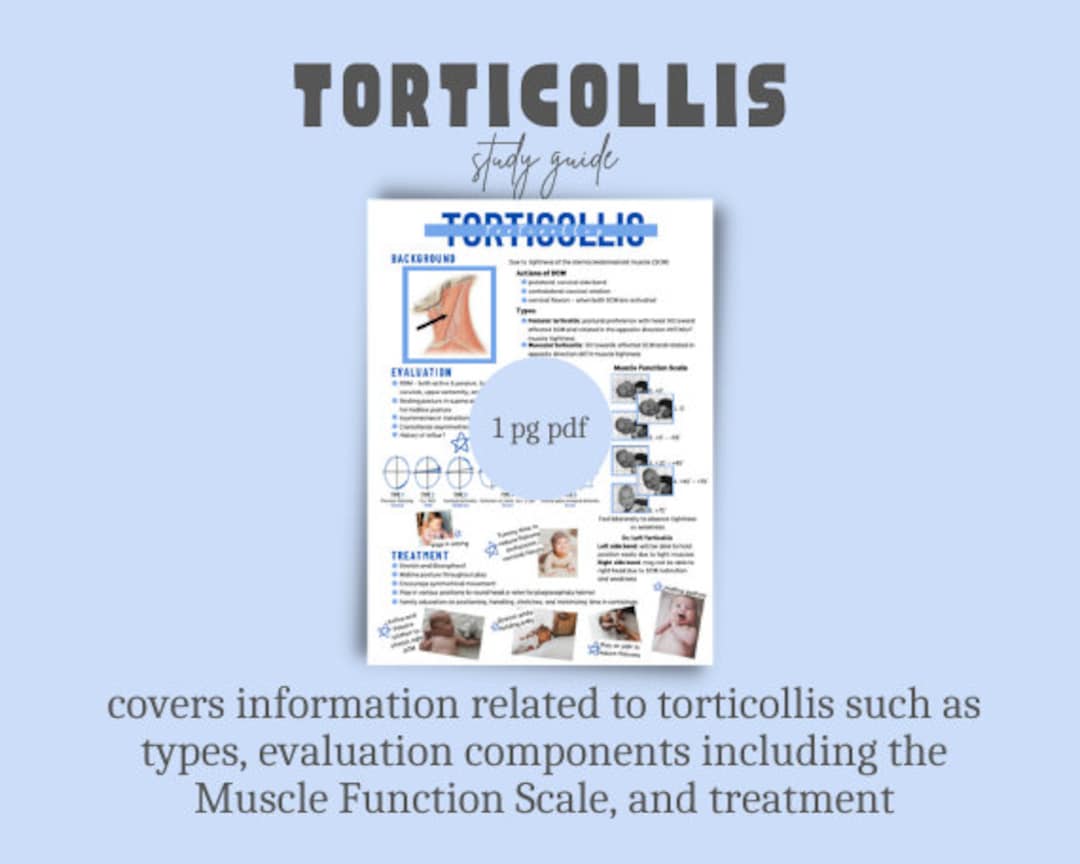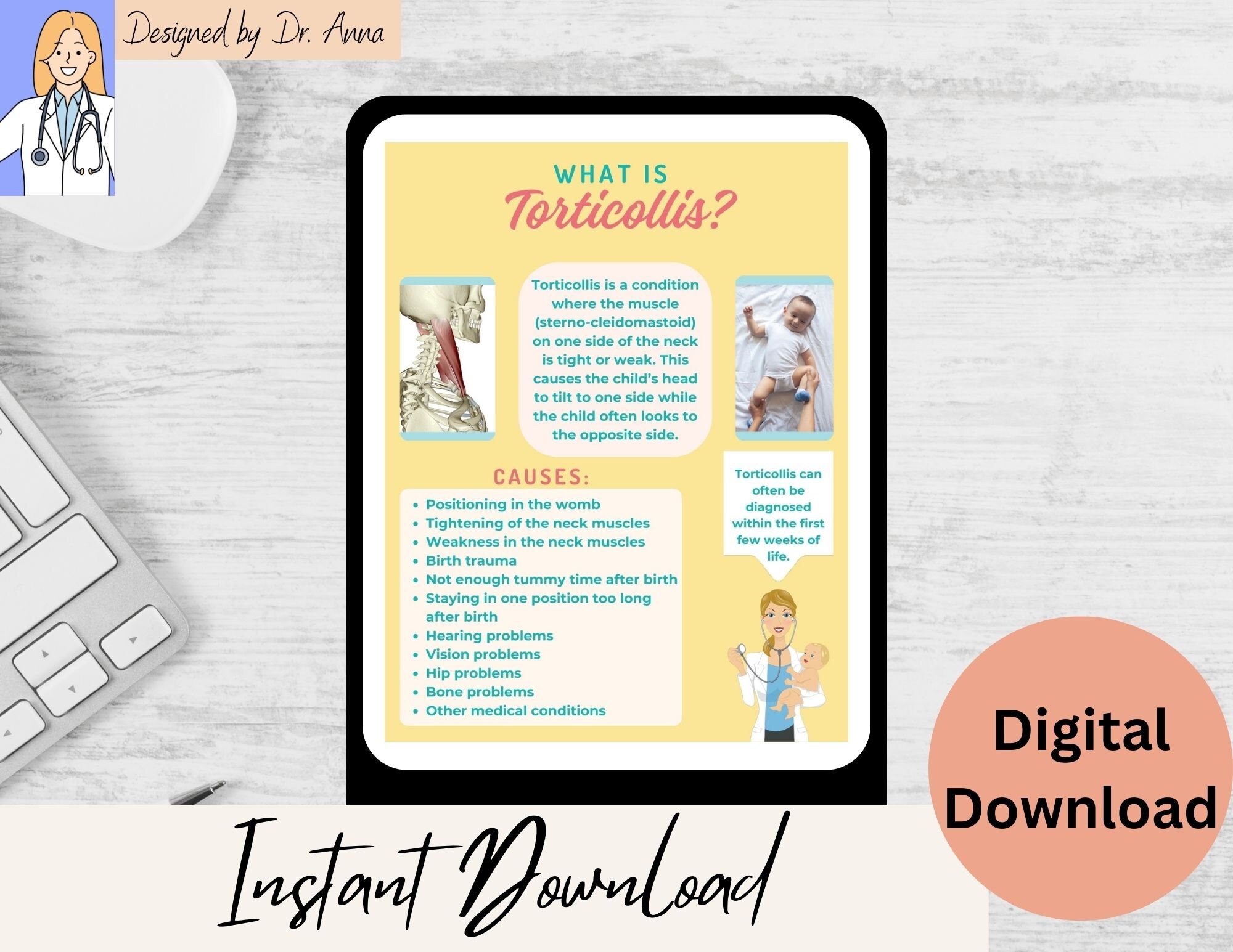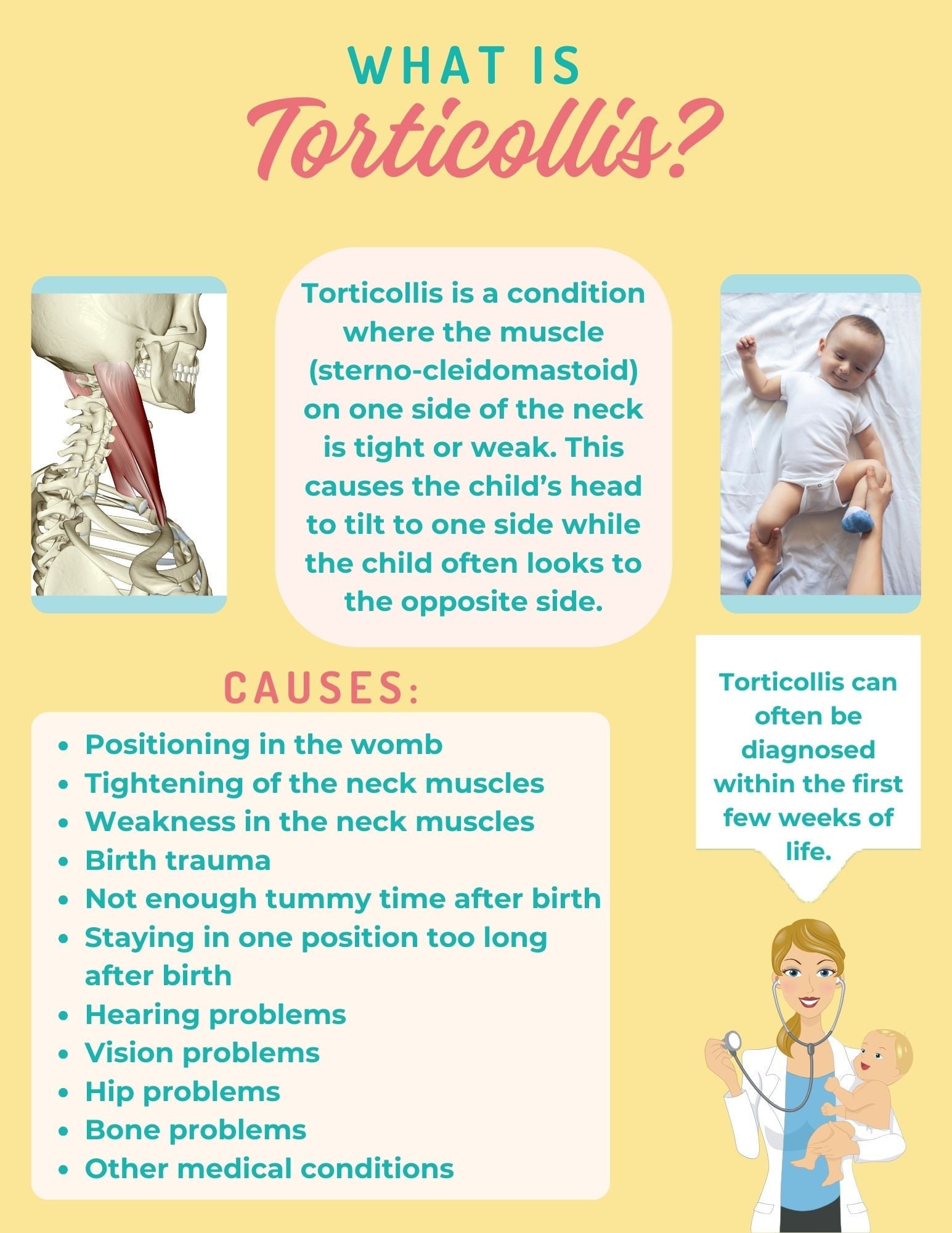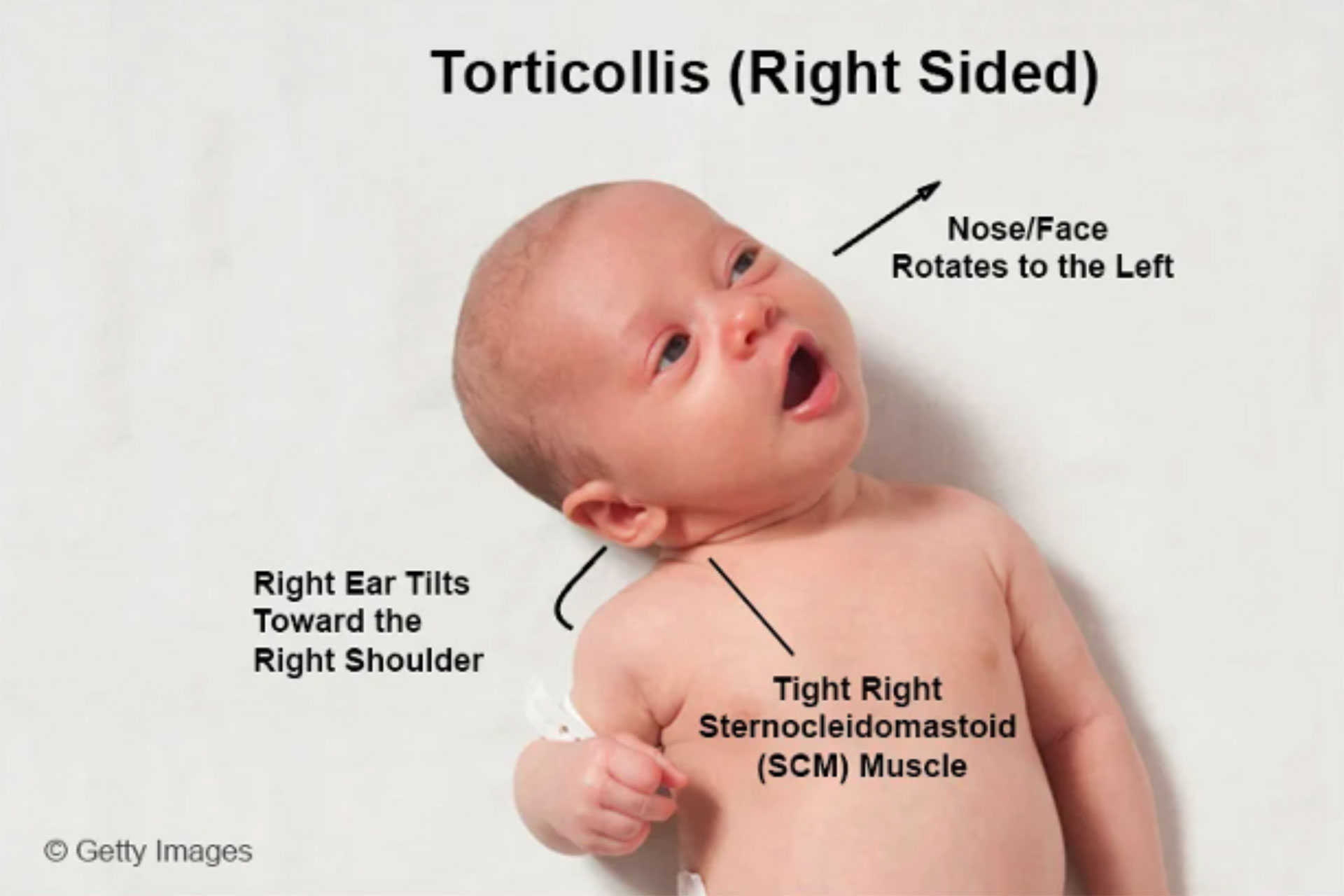Torticollis Handout For Parents
Torticollis Handout For Parents - Helping your child exercise, carrying the child properly, and putting him or her into the right position for play can help to correct torticollis. Use the stretches and positions on this handout every day for the best results. Find out how to position your child. These exercises should be performed with each diaper change, or at least 5 times a day, until your child’s neck has a normal range of motion. Learn how to stretch and strengthen the muscles on the right side of your child's neck to correct torticollis. Guide for parents s ome babies are born with a tight neck muscle that was caused by the way they were laying inside their mother’s uterus. Also, try to get your baby to look to the left and tilt their head to the. Torticollis is a shortening of your child’s neck muscles, which results is a head turn preference to one side and a head tilt preference to another. Rotates their head to the right / left side. Torticollis is common in infants.
These exercises should be performed with each diaper change, or at least 5 times a day, until your child’s neck has a normal range of motion. Torticollis is common in infants. Also, try to get your baby to look to the left and tilt their head to the. Helping your child exercise, carrying the child properly, and putting him or her into the right position for play can help to correct torticollis. Guide for parents s ome babies are born with a tight neck muscle that was caused by the way they were laying inside their mother’s uterus. Rotates their head to the right / left side. Torticollis is a shortening of your child’s neck muscles, which results is a head turn preference to one side and a head tilt preference to another. Torticollis is an abnormal position of the head and neck. Find out how to position your child. Use the stretches and positions on this handout every day for the best results.
Rotates their head to the right / left side. Guide for parents s ome babies are born with a tight neck muscle that was caused by the way they were laying inside their mother’s uterus. Torticollis is common in infants. Torticollis is a shortening of your child’s neck muscles, which results is a head turn preference to one side and a head tilt preference to another. Use the stretches and positions on this handout every day for the best results. Find out how to position your child. Learn how to stretch and strengthen the muscles on the right side of your child's neck to correct torticollis. Helping your child exercise, carrying the child properly, and putting him or her into the right position for play can help to correct torticollis. Also, try to get your baby to look to the left and tilt their head to the. These exercises should be performed with each diaper change, or at least 5 times a day, until your child’s neck has a normal range of motion.
Torticollis The Importance of Tummy Time Pediatric
Find out how to position your child. Also, try to get your baby to look to the left and tilt their head to the. Guide for parents s ome babies are born with a tight neck muscle that was caused by the way they were laying inside their mother’s uterus. Use the stretches and positions on this handout every day.
Torticollis 2 Stretches To Try At Home YouTube
Learn how to stretch and strengthen the muscles on the right side of your child's neck to correct torticollis. Find out how to position your child. Torticollis is an abnormal position of the head and neck. Torticollis is a shortening of your child’s neck muscles, which results is a head turn preference to one side and a head tilt preference.
What is Torticollis at Everything Babies
Learn how to stretch and strengthen the muscles on the right side of your child's neck to correct torticollis. Find out how to position your child. Use the stretches and positions on this handout every day for the best results. Torticollis is an abnormal position of the head and neck. Guide for parents s ome babies are born with a.
Torticollis Handout great for Physical Therapy Students & Therapists to
Guide for parents s ome babies are born with a tight neck muscle that was caused by the way they were laying inside their mother’s uterus. Helping your child exercise, carrying the child properly, and putting him or her into the right position for play can help to correct torticollis. Torticollis is common in infants. Find out how to position.
Torticollis Handout for Parents Caregivers Medical Etsy UK
Helping your child exercise, carrying the child properly, and putting him or her into the right position for play can help to correct torticollis. Learn how to stretch and strengthen the muscles on the right side of your child's neck to correct torticollis. Torticollis is an abnormal position of the head and neck. Use the stretches and positions on this.
Torticollis What Is It, Causes, and More Osmosis
Use the stretches and positions on this handout every day for the best results. Learn how to stretch and strengthen the muscles on the right side of your child's neck to correct torticollis. Torticollis is a shortening of your child’s neck muscles, which results is a head turn preference to one side and a head tilt preference to another. Rotates.
Exercises for Torticollis Physical Therapy Pinterest On the side
Also, try to get your baby to look to the left and tilt their head to the. Find out how to position your child. Rotates their head to the right / left side. Learn how to stretch and strengthen the muscles on the right side of your child's neck to correct torticollis. Helping your child exercise, carrying the child properly,.
Torticollis Exercises Handout
Learn how to stretch and strengthen the muscles on the right side of your child's neck to correct torticollis. Use the stretches and positions on this handout every day for the best results. Torticollis is a shortening of your child’s neck muscles, which results is a head turn preference to one side and a head tilt preference to another. These.
Torticollis Handout for Parents Caregivers Medical Etsy UK
Also, try to get your baby to look to the left and tilt their head to the. Find out how to position your child. Torticollis is an abnormal position of the head and neck. Torticollis is a shortening of your child’s neck muscles, which results is a head turn preference to one side and a head tilt preference to another..
What you need to know about torticollis Performance Optimal Health
Guide for parents s ome babies are born with a tight neck muscle that was caused by the way they were laying inside their mother’s uterus. Find out how to position your child. Torticollis is common in infants. Rotates their head to the right / left side. Torticollis is an abnormal position of the head and neck.
Learn How To Stretch And Strengthen The Muscles On The Right Side Of Your Child's Neck To Correct Torticollis.
Helping your child exercise, carrying the child properly, and putting him or her into the right position for play can help to correct torticollis. Torticollis is a shortening of your child’s neck muscles, which results is a head turn preference to one side and a head tilt preference to another. These exercises should be performed with each diaper change, or at least 5 times a day, until your child’s neck has a normal range of motion. Torticollis is common in infants.
Torticollis Is An Abnormal Position Of The Head And Neck.
Use the stretches and positions on this handout every day for the best results. Guide for parents s ome babies are born with a tight neck muscle that was caused by the way they were laying inside their mother’s uterus. Also, try to get your baby to look to the left and tilt their head to the. Rotates their head to the right / left side.









